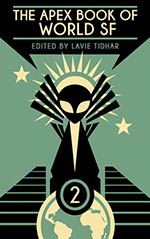
![]() nottheone
nottheone
7/3/2016
![]()
With 27 stories and one essay that seeks to define "world scifi," this anthology is a worthwhile purchase for anyone who enjoys short stories and literature by non-western authors. Notice I did not say you need to be a scifi aficionado. The variety in theme, structure and style amongst these stories practically guarantees that any serious reader of any genre will find something to like, not to mention something to ponder, within the covers of this book.
Among the stories that struck me as particularly good was one by Daliso Chaponda of Malawi. In this story of Hutus and Tutsis of the future, the importance of never forgetting the past is key. Daniel Salvo's "The First Peruvian in Space" had a wonderful turnabout that made me sit up in my chair and nod ruefully at my own prejudices. Chen Qiufan posits a chillingly horrific time in which an event called the 'filtration" literally changed how people saw the world. He goes on to describe several different people, each one with a different visual filter, for instance a man (formerly a sculptor) who can now only see in two dimensions (making me think of Flatland and The Gift of the Magi simultaneously). I loved "The Secret Origin of Spin-Man" by Andrew Drilon of the Philippines, in which a boy becomes a bit too invested in creating a superhero to whom he can relate. Time travel from a new POV, that of a mother, was what made me give "Borrowed Time" by Anabel Enriquez Piñeiro of Cuba a star in my notes. I liked "Branded" by South Africa's Lauren Beukes, not only for its depiction of corporate sponsorship taken to the Nth degree, but also for its awesomely different use of language. I had just finished reading the latest bloated tome by a certain well-known U.S. author when I read "December 8th" by the Cuban Raúl Flores Iriarte and my notes of appreciation say simply "11/22/63 in three pages ?" The format and world of "From the Lost Diary of TreeFrog7" by Nnedi Okorafor, a U.S.-born child of Nigerian parents, were very original and kept me interested and guessing right up to the end. "The Slows" by Gail Hareven of Israel is a spot-on critique of anthropologists and really anyone who pretends to understand another culture. I have been wading through lots of same-old, same-old zombie books lately, so greatly enjoyed Ekaterina Sedia's Russian take in "Zombie Lenin." Jacques Barcia of Brazil created such an interesting steampunk world in his entry "A Life Made Possible Behind the Barricades" that I was convinced it was part of a larger novel or even series of novels, but apparently he has only published short stories thus far. The final story, "Undercity," by Israel's Nir Yaniv, was a haunting examination of how humans always seem to think things would be better if only....
It can be said that many of the stories in this anthology are derivative of familiar concepts or science fiction tropes. I would not disagree, but the important thing is to notice how authors from different countries have taken those tropes, translated them into their own culture and added their own meanings. People who have grown up in the West, in the U.S. in particular, never give a moment's thought to what it is like to grow up in a small African or Latin American country, constantly bombarded by Western culture. From movies to television to music to, yes, science fiction books, kids and adults in other countries are forever consuming media about other people (mostly white people) from other places (mostly the U.S). I base this observation on experiences I had during the three years I lived abroad (Spain and Chile) and also on insights I gleaned by reading the amazing Trinidadian-born, Indian by ethnicity, and British by citizenship author V.S. Naipaul. To quote from my own review of Naipaul's A House for Mr. Biswas, "as a boy growing up in Trinidad... Naipaul was made to read Great Books of British literature. And he never saw himself or his world reflected in those books. How must it have felt to the young Naipaul when it dawned on him that if his life wasn't written about in the so-called Great Books, perhaps his life was somehow unworthy, unimportant?"
The writers in this anthology, while not breaking new ground in scifi with each paragraph, have nevertheless made the genre their own by recasting familiar themes in new settings and from their own, unique points of view. This collection would be a welcome addition to the home library of anyone who is interested in walking in another person's shoes, if only for the space of time it takes to travel to the future and back.